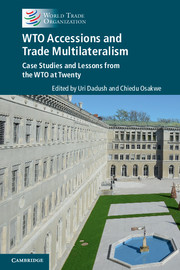Book contents
- Frontmatter
- Dedication
- Contents
- List of contributors
- Foreword
- Acknowledgements
- List of abbreviations
- Editors' note
- PART I WTO accessions, the trading system and the global economy
- PART II Overview: systemic outcomes from accessions
- PART III Members’ perspectives on accession negotiations
- PART IV Working party chairpersons’ perspectives on accession negotiations
- PART V Salient features inWTOAccession Protocols
- 29 Market access goods negotiations: salience, results and meaning
- 30 Services market opening: salience, results and meaning
- 31 WTO accession and the private sector: the nexus of rules and market opportunities
- 32 WTO accession and accession to the Agreement on Government Procurement: what is the relationship? Why should WTO acceding governments also consider GPA accession?
- 33 Energy-related rules in Accession Protocols: where are they?
- 34 Domestic framework for making and enforcing policies
- 35 Export duty commitments: the treaty dialogue and the pattern of commitments
- 36 Disciplining state trading practices: lessons from WTO accession negotiations
- 37 Intellectual property rights protection: the plus/minus debate from a least-developed country perspective – sense and nonsense
- 38 The future of multilateral investment rules in the WTO: contributions from WTO accession outcomes
- 39 Sanitary and phytosanitary measures: trends in accession plurilateral negotiations
- 40 Strengthening transparency in the multilateral trading system: the contribution of the WTO accession process
- PART VI Conclusion
- Annex: Contributor biographies
- Index
- Plate section
37 - Intellectual property rights protection: the plus/minus debate from a least-developed country perspective – sense and nonsense
from PART V - Salient features inWTOAccession Protocols
Published online by Cambridge University Press: 05 November 2015
- Frontmatter
- Dedication
- Contents
- List of contributors
- Foreword
- Acknowledgements
- List of abbreviations
- Editors' note
- PART I WTO accessions, the trading system and the global economy
- PART II Overview: systemic outcomes from accessions
- PART III Members’ perspectives on accession negotiations
- PART IV Working party chairpersons’ perspectives on accession negotiations
- PART V Salient features inWTOAccession Protocols
- 29 Market access goods negotiations: salience, results and meaning
- 30 Services market opening: salience, results and meaning
- 31 WTO accession and the private sector: the nexus of rules and market opportunities
- 32 WTO accession and accession to the Agreement on Government Procurement: what is the relationship? Why should WTO acceding governments also consider GPA accession?
- 33 Energy-related rules in Accession Protocols: where are they?
- 34 Domestic framework for making and enforcing policies
- 35 Export duty commitments: the treaty dialogue and the pattern of commitments
- 36 Disciplining state trading practices: lessons from WTO accession negotiations
- 37 Intellectual property rights protection: the plus/minus debate from a least-developed country perspective – sense and nonsense
- 38 The future of multilateral investment rules in the WTO: contributions from WTO accession outcomes
- 39 Sanitary and phytosanitary measures: trends in accession plurilateral negotiations
- 40 Strengthening transparency in the multilateral trading system: the contribution of the WTO accession process
- PART VI Conclusion
- Annex: Contributor biographies
- Index
- Plate section
Summary
ABSTRACT
This chapter asks whether distinctions exist between the original WTO least-developed country (LDC) members and the Article XII LDCs in respect of their obligations under the WTO Trade-Related Aspects of Intellectual Property Rights (TRIPs) Agreement. The chapter examines the evidence from the protocols of accession of the seven Article XII LDCs in the context of the associated treaty dialogue in their working party reports. It finds that distinctions exist and that the commitments accepted by Article XII LDCs, in some respects, go beyond the original requirements of the TRIPs Agreements and therefore also go beyond the TRIPs obligations of original LDC members. The chapter investigates these WTO TRIPs ‘plus’ commitments and assesses their merits in relation to the sovereign determined domestic reform priorities of the Article XII members and possible implications for the rules-based multilateral trading system. It is argued that the TRIPs Agreement is a minimum standards agreement, consisting of both principles and substantive obligations, with built-in flexibilities and considerable scope for interpretation and national implementation of its provisions. WTO members may deviate from these minimum standards to the extent that they benefit from longer or shorter periods of transitional relief, which may vary according to an LDC member's status as either an original member or Article XII member. Accession-specific commitments and associated treaty dialogue also show that there is implementation ‘flexibility’ on the basis of pre-determined action plans. The chapter finds that, in those instances where Article XII LDCs members have undertaken legally binding commitments to implement WTO-plus obligations, the substantive minimum standards of protection of the TRIPs Agreement have been increased. These WTO-plus binding commitments have been used to ‘lock in’ domestic institutional and structural reforms, based on domestic development priorities to encourage innovation and attraction of foreign direct investment, and they have served a domestic reform purpose to encourage innovation, induce foreign direct investment and strengthen the TRIPs Agreement by increasing substantive minimum standards.
The WTO Agreement on Trade-Related Aspects of Intellectual Property Rights (TRIPs Agreement) is the most comprehensive multilateral agreement on intellectual property (IP) rights, containing all aspects of IP rules, and also substantive obligations rules for enforcement and dispute settlement. The TRIPs Agreement in Article 66 includes special provisions (with respect to transition periods and the transfer of technology) for least-developed countries (LDCs) in view of their specific situation.
- Type
- Chapter
- Information
- WTO Accessions and Trade MultilateralismCase Studies and Lessons from the WTO at Twenty, pp. 795 - 817Publisher: Cambridge University PressPrint publication year: 2015
- 1
- Cited by



